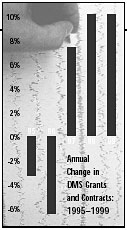Research funding increases by 10% for the second year
Research awards to DMS totaled over $64 million in fiscal year 1999. The sum marked a 10% increase over FY98 and the second year of double-digit growth—a welcome turnaround from the decreases of a few years ago.
Adam Keller, associate dean and chief operating officer of DMS, gives the credit to the researchers themselves. He notes that long-time faculty members have been more aggressive and successful in winning external funding recently. "[They're] really turning up the level of research a full notch," he says.
Funding: Keller also credits the "recruitment of new faculty who are productive academicians." He points both to new young researchers —such as Drs. Steve Fiering in microbiology and Michael Spinella in pharmacology and toxicology, both of whom have secured funding since coming to Dartmouth—as well as to established researchers new to DMS. In the latter category, for example, are Drs. James Weinstein, who brought in $2.5 million to study back pain, and Ethan Dmitrovsky, who was awarded $1.1 million for various oncology projects.
 Other principal investigators
credited with $1 million or more
during FY99 were Drs. William
Wickner, Allen Dietrich, E.
Robert Greenberg, John Baron,
Randolph Noelle, Eugene Nattie,
Charles Wira, Robert Drake,
Peter Silberfarb, and Harold
Swartz. Their work runs the
gamut from molecular mechanisms
to psychiatric services.
Other principal investigators
credited with $1 million or more
during FY99 were Drs. William
Wickner, Allen Dietrich, E.
Robert Greenberg, John Baron,
Randolph Noelle, Eugene Nattie,
Charles Wira, Robert Drake,
Peter Silberfarb, and Harold
Swartz. Their work runs the
gamut from molecular mechanisms
to psychiatric services.
Over two-thirds of the awards came from the U.S. Department of Health and Human Services (HHS), which Keller sees as a "marker of our success and the quality of our research," given the competitiveness of the HHS system. In fact, DMS once again ranked above the 85th percentile among all medical schools in federal funding per basic science faculty member. But while Keller expects DMS to remain aggressive in pursuing HHS grants, he hopes to also develop more partnerships with corporate sponsors of basic research. Corporations accounted for about 10% of external funding in FY99.
Impact: The growth in awards represents more than just numbers on paper, however. It has a distinct impact on day-to-day life at DMS, benefiting students, patients, and the institution in general.
The increased funding has fueled expansion of the basic science graduate programs, meaning DMS now has more graduate students than ever before. This has created a cycle of growth in what Keller terms "the life of the laboratory." As he explains it: "Having young, excited minds there contributes to the research [and] having a really active research profile is what attracts those people to the institution." Keller adds that this also allows more undergraduates to serve research clerkships.
The benefit to patients comes from the expansion of clinical trials based at DHMC. Keller is excited about Dartmouth's increasing capacity to run trials that "originated here, were written here, and are federally funded." For example, Keller points to the work of Drs. Randolph Noelle and Lloyd Kasper in using an agent Noelle discovered to treat multiple sclerosis (see page 7).
A final notable trend is the increased opportunity for collaboration within the Dartmouth community. And Keller anticipates even stronger ties between DMS and the College due to the recent establishment of a genetics department.
Looking to the future, Keller again focuses on the budding genetics department, which he believes will help to sustain the growth in awards. But he emphasizes that the "bottom line" is not the funding itself, but the research it makes possible. "We had such a phenomenal awards year last year," he concludes, "that I really expect a great year this year in terms of the actual research that gets done."
Jonathan Weisberg
If you would like to offer any feedback about this article, we would welcome getting your comments at DartMed@Dartmouth.edu.
